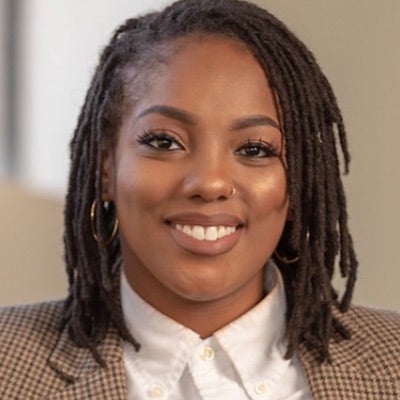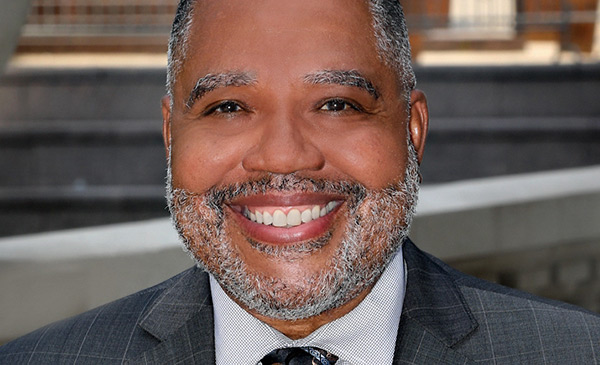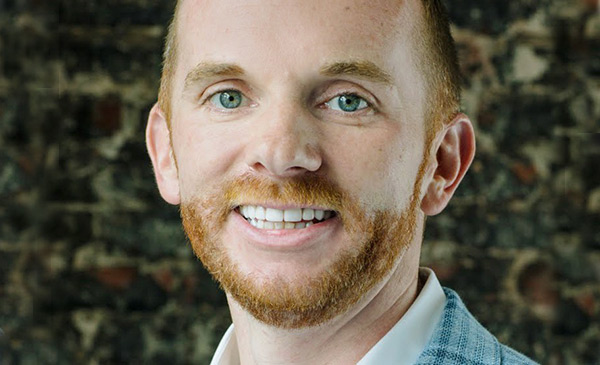Student Spotlight: Janaé Eboni Bonsu
Doctoral student Janaé Bonsu's research focuses on the intersection of interpersonal and institutional violence among Black people of marginalized genders, and the impact on survivors’ safety-related empowerment. As an activist, she is a member of UIC’s Policing in Chicago Research Group, and is very involved in Black Youth Project 100, a national organization that organizes through a Black queer feminist lens. At BYP100, she has played many leadership roles, including serving formerly as National Co-Director.
An Interview with Janaé Eboni Bonsu Heading link

Tell us about your involvement in UIC’s Policing in Chicago Research Group and what you hope to accomplish there?
The PCRG has been, and continues to be, a space where my work as a researcher and organizer converge, and I’ve been involved in the PCRG from the beginning. We provide research support to social movements confronting racialized policing in Chicago, and that research is accessible to the public and intended to be useful for mobilizations. We share our findings with organizers and community members through workshops, teach-ins, youth-led research projects and public reports. As a student, I already had research interests in policing, and as an organizer I have been really invested in the role of research as an organizing strategy.
How does your work with PCRG intersect with the college’s history of advocacy around police accountability and community oversight of policing?
The fact that JACSW even has a history of advocacy around police accountability and community oversight is so cool to me; that history really affirms my choice of JACSW as an academic home. I can definitely see overlap between the PCRG and the college’s history in how both efforts understood the value of collaboration between different sectors to help shape concrete outcomes towards a more just Chicago. For example, the Jane Addams Center for Social Policy and Research was involved in the creation of the Chicago Coalition for Police Accountability, as well as the Independent Police Review Authority. So there is a great synergy here.
Black Youth Project 100 has a strong focus on and leadership from queer women of color. What are your perspectives on activism at the intersection of race, gender, sexual identity and violence?
I got involved with BYP100 shortly after it was founded, and it was in that space that I was introduced to the notion of organizing through what they call a “Black queer feminist lens”. Lens is a good way to describe it because I do think about it as putting on a pair of glasses that sharpen the way you view problems and solutions, so you can clearly see those who are often made invisible at the margins of society.
This intersectional lens is really critical to me when considering violence, because when you center the most marginalized in what can be considered effective interventions for violence, you can understand how one-size-fits-all approaches can not only be inadequate, but potentially harmful. An intersectional lens allows you to clearly see the whole picture in order to advocate for different approaches. When we can do this, more becomes possible.
My own research really uses that same lens. It makes me vigilant about my methods and the stories that I seek to center. It makes me think twice about whose experiences are and are not represented when thinking about policy and practice implications of research.
Pullquote #1 Heading link
This intersectional lens is really critical to me when considering violence, because when you center the most marginalized in what can be considered effective interventions for violence, you can understand how one-size-fits-all approaches can not only be inadequate, but potentially harmful.
Interview part 2 Heading link
Please tell us about your doctoral dissertation.
My dissertation, Reconceptualizing Safety: Examining the Intersections of Interpersonal Violence, Institutional Violence and Survivor Empowerment, is a mixed methods study about the violence and harm that gender-oppressed Black people – women, trans and nonbinary folks – experience from institutions and how those experiences relate to violence and harm within their homes and broader community. Additionally, the study explores how those experiences of victimization and survival shape one’s conceptions of safety, and one’s sense of empowerment to obtain and
maintain it.
I believe this research will be critical for social workers to better understand and respond to the ways that intersectionality shapes institutional violence, so that we can do the work to not only interrupt it, but also ensure that we don’t inadvertently perpetuate harm against the very people to whom we’re committed.
You are featured in the new documentary film Unapologetic, which describes your activism as abolitionist. What does abolitionist social work mean to you?
I had originally understood abolition only in the context of slavery, not in terms of the prison industrial complex. I think a common mis-conception of prison abolition is that it’s all about getting rid of brick and mortar buildings full of cages, but it’s so much bigger than that. I now understand abolition as the theory and practice of chipping away at a vast system of punishment and surveillance while also developing new beliefs, practices, institutions, and systems to regulate our collective lives and redress shared problems.
More specifically, I think the criminal legal system operates on carceral logics like isolation, blame, control, surveillance, and punishment. If we’re not careful, these same logics can creep into well-meaning practices and policies in social work and related fields. Thus, an abolitionist social worker’s task is the constant inquisition of how to keep “carceral creep” at bay and find ways to develop transformational models that do not rely on systems of domination, punishment, and captivity.
Pullquote #2 Heading link
I think the criminal legal system operates on carceral logics like isolation, blame, control, surveillance, and punishment. If we’re not careful, these same logics can creep into well-meaning practices and policies in social work and related fields.
Interview part 3 Heading link
This spring you were named a UIC Black History Maker. What is the significance of this for you?
Novelist and poet Alice Walker once said, “activism is the rent we pay for living on the planet.” I share this sentiment, so it’s really an honor to be recognized for work that I feel is the least I can do. I was drawn to UIC in large part by many of the activist-scholars here, so to be named a UIC Black History Maker makes me feel like my work and commitments on and off campus fall in line with the Black history makers on whose shoulders I stand today.
What has been the best part of your experience in the JACSW doctoral program?
I’d say the first two years of coursework was the highlight of my experience at JACSW, because taking courses and being in the building nearly every day provided me with opportunities not just to learn something new every day, but to also build strong relationships within my cohort and with faculty. That consistent interaction shifted a bit once I completed my coursework and started my dissertation, but those foundational years in the program were a truly rich and supportive environment.
What advice do you have for people considering a PhD in social work?
I highly recommend pursuing a PhD in social work to anyone who wants to be on the forefront of research around urgent, real-world issues affecting our society, especially if you’re interested in a career in higher education or research-oriented organizations. A PhD in social work is versatile in that you can go on to pursue policy, community organizing or nonprofit work. If you are interested in a range of issues where social justice is a core aspect, from mental health care to incarceration practices, social work is an excellent choice.
For those who may be just about to begin their PhD in social work, I would advise them to appreciate the journey in all its challenges. Most importantly, I’d advise incoming PhD students to not be afraid to ask for help when you need it; you don’t have to figure everything out on your own.
Is there anything you’d like to add to our conversation?
I’m just incredibly grateful that I had the opportunity to do my studies here. JACSW was my first and only choice to pursue doctoral studies, and as I’m nearing the end of my doctoral education, I can truly say that the college really walks the talk of its mission. I’m proud to have been intellectually nurtured in this environment and empowered to take action on issues I truly care about.

